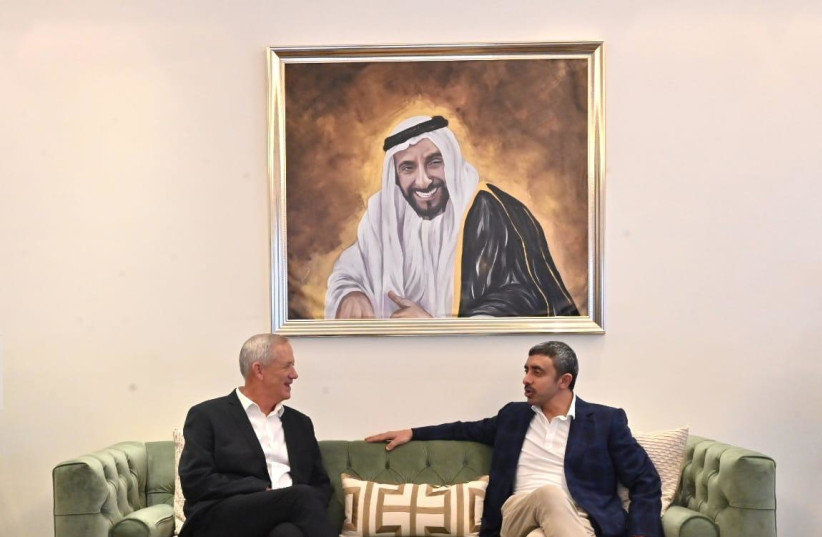While tensions remain high with Iran and violence increases in the West Bank, Defense Minister Benny Gantz met with United Arab Emirates Foreign Minister Sheikh Abdullah bin Zayed on Sunday to discuss a joint architecture to ensure regional stability.
UAE Ambassador to Israel Mohamed Al Khaja hosted the two men at the ambassador’s residence in Herzliya, as part of a series of events to mark two years since the signing of the Abraham Accords.
<br>Israel and UAE ties flourishing
Gantz and bin Zayed discussed the relations between the two countries, focusing on policy, security and economic issues as well as the need to deepen security cooperation and maintain regional stability.
According to a statement released by his office, Gantz and bin Zayed also spoke about strengthening the Palestinian Authority, seen by Israel to be losing its grip in the West Bank.
“Minister Gantz conveyed his appreciation for UAE President HH Sheikh Mohamed Bin Zayed, whose leadership has enabled ties between the countries to flourish,” read the statement released by his office.

Bin Zayed landed in Israel on Wednesday and met with Prime Minister Yair Lapid and President Isaac Herzog. The Emirates’ top diplomat visited Yad Vashem where he laid a wreath in the Holocaust center’s Hall of Remembrance.
Israel and the UAE normalized relations in 2020 as part of the Abraham Accords and ties have flourished since. The two countries have exchanged ambassadors, signed dozens of bilateral agreements, and several senior military officials have visited.
Israeli defense officials have held some 150 meetings with their counterparts in the region and signed more than $3 billion worth of deals since the signing of the Accords in order to increase its military-to-military ties and to sign defense deals.
Trade between Israel and the UAE alone is expected to reach over $2b. in 2022.
Iran: The common threat
Both Israel and the UAE have worked together covertly for years against Iran’s hegemony. According to foreign reports, behind closed doors they have improved their intelligence sharing and military relations to be prepared for Iranian threats.
Following the normalization agreement signed as part of the Abraham Accords, the UAE’s Minister of State for Defense Affairs Mohammed al-Bawardi and Gantz agreed to establish security ties between the two countries.
Both IDF Chief of Staff Lt.-Gen. Aviv Kohavi and Gantz believe that moderate Sunni states such as the UAE, Bahrain and others that have yet to sign agreements with Israel, can deepen their ties, especially in terms of regional security arrangements.
As Iranian rocket and drone attacks have increased, talks have been taking place between Israel and several Gulf states to understand how best to counter the threats.
Gantz has said that Israel is building a US-sponsored ‘Middle East Air Defense Alliance’ that has already thwarted threats and “that will strengthen the cooperation between Israel and countries in the region.”
The alliance has reportedly brought together Israel with Arab states in the Middle East around a shared table in order to defend their countries from Iran and its proxies, which have increased their attacks, some of them deadly, in recent years.
The Negev Forum
The government on Sunday approved a mechanism by which to allow the Negev Forum of Israel and Arab foreign ministers to advance regional ties.
“The cabinet decision formalizes and funds the working groups for the Negev Forum, which we established last year together with the United States, the United Arab Emirates, Bahrain, Morocco and Egypt,” Lapid said.
“These working groups will create economic and security links which, just a few years ago, we could not have even dreamed of. We are working together with entrepreneurs in food-tech, water, energy, tourism and climate, increasing trade between our countries, and are holding a dialogue that strengthens Israel’s security,” Lapid added.
Under the rubric of the Negev Forum, there will be six working multilateral groups in the fields of food security and water, energy, tourism, health, education and tolerance, and regional security, the Prime Minister’s Office said.
The initial meeting that took place in March was a byproduct of the Abraham Accords, signed in Washington on September 15, 2020.
The Accords allowed for Israel to normalize ties with the UAE, Morocco and Bahrain. Sudan, which is also part of the Accords, did not participate in the forum. Egypt, however, which normalized ties with Israel in 1979, did join.
